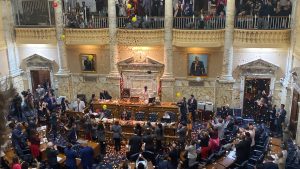By Tashi McQueen,
AFRO Political Writer,
tmcqueen@afro.com
On April 10, the first Maryland legislative session with a Black Governor ended.
Gov. Wes Moore created ten pieces of legislation and signed SB555 – Fair Wage Act of 2023 and HB547 – Family Prosperity Act of 2023, the day after “Sine Die.”
“I entered office saying that this administration would launch the most aggressive, the most strategic, bipartisan, all-out assault on child poverty this state has ever seen,” said Gov. Moore. “I am proud because this session showed that we can move differently. It showed we can move in partnership. And it showed that once again, Maryland can do big things, and Maryland can lead.”
April 10 was adjournment day, the final day of the 90-day session where Maryland legislators gathered to debate and pass last-minute legislation. Each session, once it hits midnight, no more bills may be passed, anything not passed becomes null and void and the session is adjourned until next year.
Legislators must repeat the process in the next session if they want to pass a bill that died the previous year.
Sen. Cory V. McCray (D-Md.-45) reflected on the assembly’s accomplishments.
“I think this session was very successful for Baltimore City and Black Marylanders,” McCray told the AFRO. “We’re investing in resources and safe outlets for youth with an additional $400,000 allocated to the Mac Lewis Boxing Gym and expanding Baltimore City Recreation and Parks Boy and Girls Middle School Basketball league.”
Sen. Jill P. Carter (D-Md.-41) highlighted a bill that died this session which she found “heartbreaking.”
“SB97 passed the Senate and then sat in the House Judiciary Committee and received no vote,” said Carter. “Some people may think it’s controversial to broaden juries, but I’ll tell you, the general public should love it because it means that those of us that are called to jury service all the time would be called less because we’d have a larger pool from which to choose.”
The 2023 session also brought the anticipated Cannabis Reform bill, student loan debt relief for students of historically Black institutions and a bill that requires written notice for rent increase.
Cannabis
The much-awaited Cannabis reform bill SB516/HB556 and subsequent legislation took up to the last day to be passed.
“The Cannabis bill is huge,” said Sen. Antonio Hayes (D-40). “The bill will increase the number of licenses to cultivate and process dispensaries with priority to social equity, establish a new social equity office grant program, and establish the Cannabis Regulation and Enforcement division.”
Highlights of the bill include the establishment of micro-licences and the Maryland Incubator Program to help small businesses enter the cannabis industry and creating a sales and use tax of 9 percent.
The House Cannabis Reform bill was passed on April 8 and the Senate version of the reform bill was passed on adjournment day after the Senate concurred with the House amendments.
The Legislative Black Caucus of Maryland sponsored HB 1071, a bill that will alter the maximum fines for smoking cannabis in public and prohibit law enforcement from conducting a stop and search solely based on odor.
HB1071 passed both chambers in the last 10 minutes of the session and was sent to the governor’s desk. The bill will go into effect on July 1.
Legislative Black Caucus Agenda
HB680– Passed both chambers and was sent to the Governor’s desk.
The Student Loan Debt Relief Tax Credit legislation increases the amount of student debt relief tax credits the Maryland Higher Education Commission (MHEC) can approve for any taxable year, from $9 million to $18 million. It also requires MHEC to reserve $9 million in authorized credits for State employees.
“This bill will also require MHEC to reserve $5 million of authorized credits for graduates at historically Black colleges or universities,” said Del. Vanessa Atterbeary, a democrat from Howard County’s District 13, on behalf of the Legislative Black Caucus of Maryland (LBCM). “In passing this legislation, we are hoping to diminish the financial barriers associated with furthering and paying for one’s education in the State of Maryland.”
The bill will take effect July 1 and applies to tax year 2023 and beyond.
HB151 – Passed both chambers and was sent to the governor’s desk.
HB151 bill requires a landlord to notify a residential tenant in writing prior to a rent increase. The bill also establishes reporting requirements for local jurisdictions that adopt local laws limiting rent increases under specified circumstances.
This bill will go into effect on October 1.
HB376/SB0184 – Passed both chambers and was sent to the governor’s desk.
The policies and health benefit plans will be effective on or after Jan. 1, 2024.
“Today, Black women are disproportionately impacted by breast cancer and are often diagnosed at a later stage, resulting in a higher mortality rate,” said Del. Joseline Peña-Melnyk (D-Md-21) in her submitted written statement. “There are many present disparities in cancer detection, and this bill aims to remedy and close the financial gap impacting many Black Marylanders.”
If House bill 376 is signed, it will prohibit health service providers and insurance companies that cover breast examinations from enforcing copayment obligations to perform diagnostic tests.
Baltimore Liquor Licensing
The Baltimore City Delegation, on behalf of Mayor Brandon Scott, supported HB916 which aims to regulate Baltimore’s Social Club Task Force, which works to ensure businesses are up to code.
HB916 raises the maximum fine, $3,000 to $20,000, that the board can enforce. The legislation also creates a diversion process for the Baltimore City Liquor Board that would allow a licensee in violation to opt to pay a fine instead of going through the full processes of a hearing.
This legislation has been passed by both chambers and sent to the governor’s desk.
A handful of other bills from the Baltimore City Delegation pertaining to liquor licensing were approved to provide event promoters permits that would cycle funds back into Baltimore, allowing a historic duckpin bowling alley to maintain its license through renovation and allow a florist to sell alcohol.
All Baltimore City liquor licensing bills have been passed by both chambers and have been sent to be signed by Governor Moore.
FY 24 Budget
The budget bills HB 200 and HB 202 are awaiting Gov. Moore’s signature.
On the way to his desk, division arose between the House and Senate regarding the Broadening Options and Opportunities for Students Today (BOOST) scholarship program and transportation project funding.
“When the governor introduced it, he lowered the amount to BOOST. The House didn’t change that but the Senate increased the amount back to 10 million, which is what it had been before Gov. Moore’s decrease,” said David Schuhlein, communications director for the Senate president.
The general assembly settled on $9 million for BOOST in the end.
“The Senate wanted to leave money for the governor for transportation projects. The House left 100 million and we left 200,” said Schuhlein.
Gov. Moore originally wanted 500 million according to transportation as stated in his proposed budget.
Transportation projects such as the Baltimore Redline were allocated $100 million in the end.
Tashi McQueen is Report For America Corps.
Similar articles:
Top-legislation-that-could-potentially-impact-maryland-seniors
Leaders-of-build-implore-lawmakers-to-address-vacant-buildings-in-baltimore-city-with-legislation
Maryland-senators-and-delegates-race-to-introduce-legislation-before-the-deadline
mfume-introduces-legislation-to-increase-witness-protection-in-baltimore
The post AFRO review: Maryland General Assembly’s 445th session wraps up appeared first on AFRO American Newspapers .










